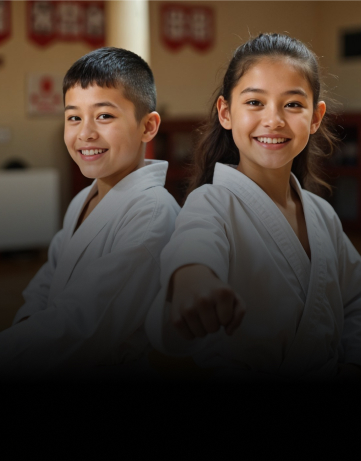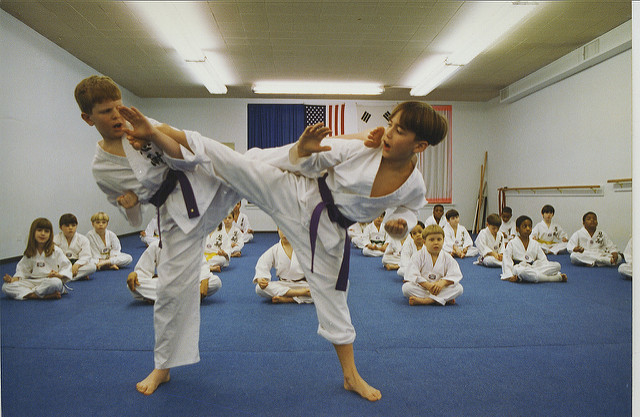Best Martial Arts for Families – Memorable Moments and Growth Together
Best Martial Arts for Families – Memorable Moments and Growth Together
Blog Article
How Karate for Children Can Boost Self-confidence and Technique in Young Martial Artists
Karate for kids provides an one-of-a-kind opportunity to develop self-confidence and self-control in young martial musicians. As they discover brand-new strategies and face challenges, they not just gain skills yet also create a solid feeling of self-regard. This organized setting urges them to respect the journey of improvement. But just how does this training equate into their everyday lives? Discover the much deeper connections that make karate greater than just a sport.
The Importance of Confidence in Youth Advancement
Confidence is a necessary building block in childhood development. When you nurture your youngster's self-confidence, you encourage them to encounter difficulties, take risks, and express themselves openly. Kids with self-confidence are much more going to explore brand-new tasks and social scenarios, which can bring about long-term relationships and beneficial experiences.Encouraging your child to get out of their convenience zone promotes resilience. They find out that failing isn't the end yet rather a tipping rock to success. By commemorating their achievements, despite just how small, you help them identify their capabilities and worth.In this trip, support and favorable reinforcement from you play a crucial duty. Whether it's via praise or merely being present, your involvement enhances their self-confidence. As they expand, this confidence comes to be a lifelong asset, equipping them to browse both obstacles and possibilities with a strong sense of self.
How Karate Shows Discipline and Focus
Karate aids you construct discipline and emphasis through its organized training routine. As you practice mindfulness during each session, you'll learn to focus much better both on and off the floor covering. And also, establishing and attaining objectives in karate strengthens your ability to stay attentive and dedicated.
Structured Training Program
While you take part in karate training, you'll quickly uncover exactly how a structured program instills self-control and emphasis in young specialists. Each class adheres to a details style, including warm-ups, technique practice, and sparring. This consistency educates you to commit and value the process to improvement. As you discover methods and types, you develop a sense of duty for your own progress.The structured setting encourages you to set objectives, whether understanding a new belt or developing a kata. You'll find that staying focused during classes and drills hones your focus. The discipline you grow in martial arts expands past the dojo, positively affecting your schoolwork and day-to-day routines. Each session strengthens the significance of devotion, aiding you become a more self-displined individual.
Mindfulness in Technique
As you exercise karate, you'll discover that mindfulness ends up being an important part of your training. Each action requires your complete focus, helping you remain focused on today moment. You'll discover to tune out interruptions and focus on your breathing, motions, and purposes. This enhanced awareness hones your reflexes and improves your discipline.During sparring or types, you'll find the relevance of being mentally present - Karate Salisbury MD. You'll discover how this focus not only boosts your technique but additionally develops your confidence. By practicing mindfulness in martial arts, you cultivate perseverance and durability, crucial traits that prolong beyond the dojo. This way, karate educates you to harness your mind, aiding you create a self-displined method to obstacles both on and off the floor covering

Setting Goal Techniques
Establishing goals in martial arts isn't simply concerning gaining belts; it's a powerful way to cultivate self-control and focus. When you establish particular, achievable targets, you create a roadmap for your development. Instead of just intending to improve your kicks, try focusing on understanding a specific method each month. This method keeps you motivated and engaged.Breaking down larger goals into smaller, workable actions assists you track your progression and commemorate tiny triumphes in the process. Whether it's improving your stance or enhancing your sparring endurance, every goal reinforces your dedication. As you achieve these objectives, you'll build self-confidence in your abilities and establish a strong feeling of technique that expands beyond the dojo right into day-to-day life.
Building Durability With Martial Arts
Fighting style, particularly karate, uses youngsters a special opportunity to build resilience in a supportive setting. In courses, they encounter obstacles that push their limits, whether it's grasping a brand-new technique or sparring with a companion. Each problem, like a missed kick or a lost suit, comes to be an opportunity to find out and grow.As they practice, kids learn to welcome discomfort and keep trying, even when points obtain difficult. They discover that failure isn't the end; it becomes part of the journey. This way of thinking assists them recover stronger, not just in the dojo, but in day-to-day life.With each difficulty they conquer, your kid develops self-confidence in their capability to tackle challenges, sustaining their decision. Through martial arts, they'll comprehend that durability isn't simply regarding physical strength; it's about mental grit and determination, empowering them to deal with whatever life throws their way.
The Role of Respect in Martial Arts Training
Respect is a foundational concept in karate training, promoting a culture of discipline and camaraderie among students. When you step onto the dojo flooring, you're not simply discovering techniques; you're also learning to respect your trainers, peers, and the art itself (Karate Salisbury MD). Bowing at the start and end of class isn't simply a formality; it signifies your recommendation of others' efforts and dedication.As you establish shared respect, you'll find it improves your knowing experience. You'll listen much more diligently to your instructor and gain insights from fellow trainees. This environment motivates positive criticism and support, allowing every person to expand together.Moreover, respect grows self-control. Acknowledging the value of effort and humbleness helps you remain concentrated on your training. In turn, this respect equates right into your daily life, improving your communications and relationships outside the dojo. Through karate, you learn that respect is necessary for personal growth and neighborhood structure
Setting Objectives and Achieving Success in Martial arts

Social Abilities and Teamwork in the Dojo
While training in the dojo, kids normally create necessary social skills and team effort capacities. As they exercise alongside peers, they find out to communicate efficiently, share space, and assistance each other. Each class presents chances for cooperation, whether it's throughout partner drills or team workouts. This teamwork cultivates relationships and produces a feeling of belonging, making the dojo a nurturing environment.Kids likewise acquire beneficial problem resolution skills. When they encounter challenges, such as disputes throughout sparring, they learn to browse these scenarios constructively. They practice patience and empathy, comprehending that everyone has different staminas and weaknesses.Moreover, participating in team activities cultivates a sense of accountability. You'll see your child learning to count on teammates and take responsibility for their function in a group. These experiences not only enhance their martial arts trip but likewise equip them with social devices they'll bring right into various other locations of life.

The Long-Term Conveniences of Karate Beyond Childhood Years
As kids mature and change right into their adult years, the benefits of karate prolong much beyond the dojo. You'll locate that the technique and focus found out with martial arts can convert into your professional and academic life. Establishing and accomplishing goals in fighting styles fosters a solid work ethic, which can push you to stand out in any endeavor.Moreover, the self-confidence gained from understanding strategies and competing can boost your self-confidence, aiding you tackle obstacles head-on. This durability comes to be important as you encounter the unpredictabilities of adulthood.Additionally, the social abilities developed through team effort and friendship in the dojo can cause far better relationships in both individual and expert rounds. You'll discover to connect properly, resolve conflicts, and construct a supportive network.Ultimately, karate shapes not just proficient martial artists, however well-shaped people prepared to tackle the world.
Regularly Asked Inquiries
What Age Is Best to Beginning Karate for Kids?
You can start martial arts as early as age four or five, but it commonly relies on your child's maturity and interest. Discovering a class that fits their age and power degree makes a huge distinction.
Exist Any Wellness Advantages From Exercising Karate?
Yes, practicing karate deals numerous health benefits. You'll improve your stamina, coordination, and flexibility while enhancing cardiovascular fitness. And also, it boosts focus and mental health, making it a fantastic option for general physical and mental health.
Just How Commonly Should Kids Participate In Karate Classes?
You must encourage your kids to go to karate courses at the very least two to 3 times a week. Uniformity helps them learn strategies properly and develop abilities, making their experience a lot more satisfying and satisfying over time.
Can Karate Assist With Handling Anxiety in Children?
Yes, martial arts can help manage anxiety in youngsters. It educates emphasis and self-discipline while offering a safe electrical outlet for power. You'll see your kid growing more calm and confident as they practice on a regular basis.
What Gear Is Required for Kids Starting Martial Arts?

Report this page